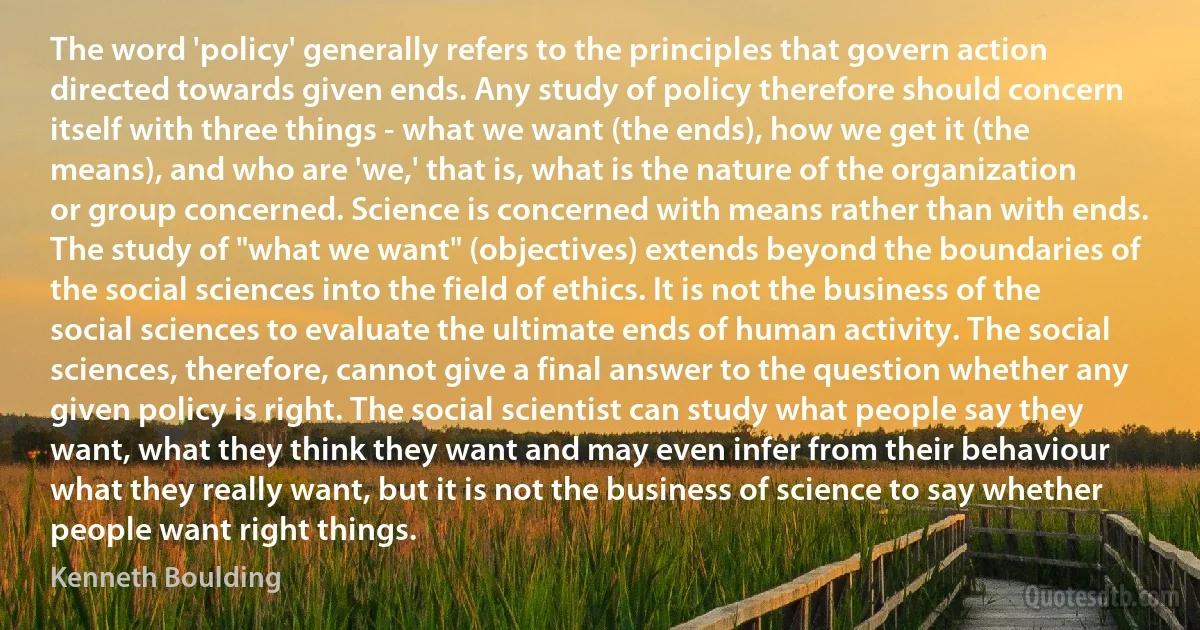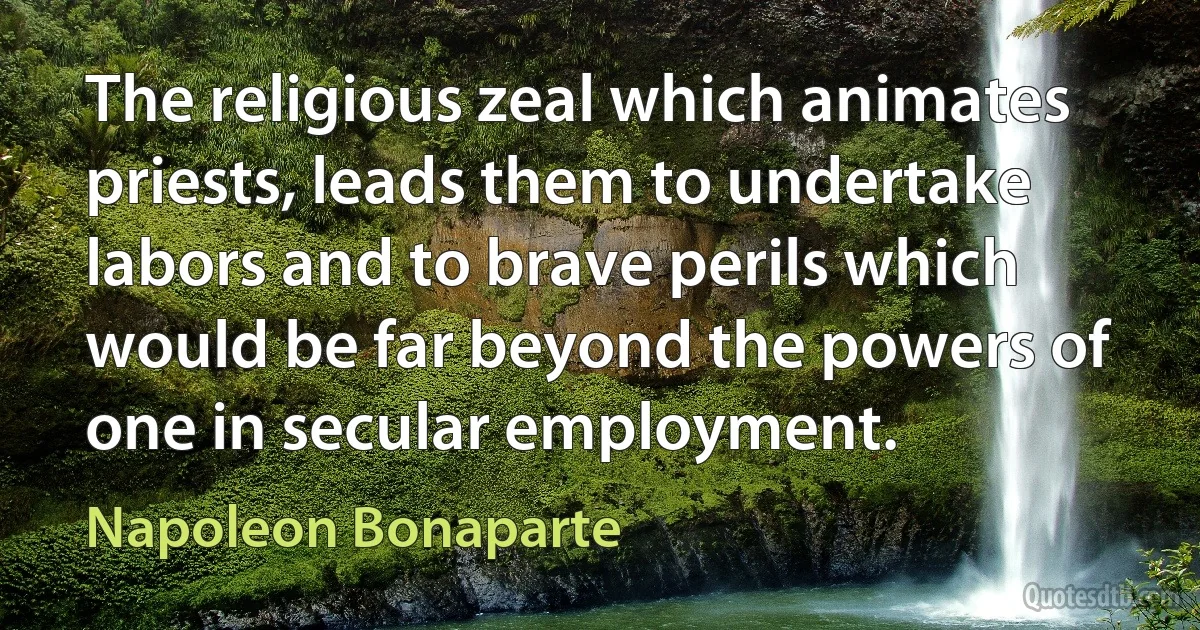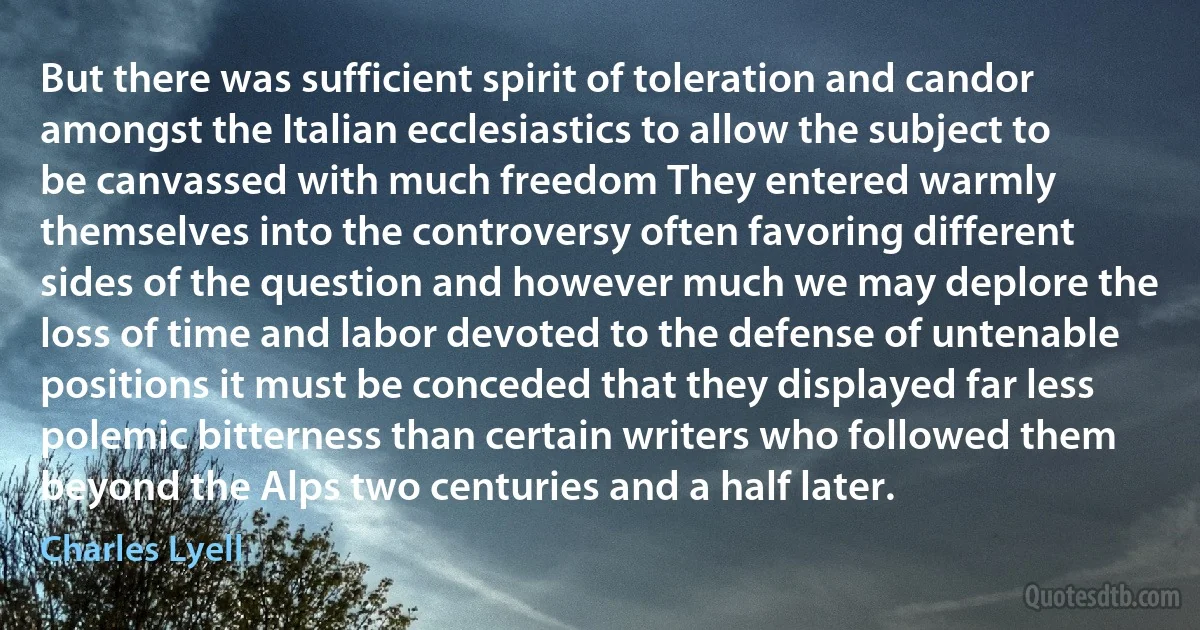Beyond Quotes - page 69
The human being, on the other hand, is firmly located in a temporal process. He has an image of the past which extends back far beyond the limits of his own life and experience, and he likewise has an image of the future. Closely associated with the time structure of his image is the image of the structure of relationships. Because we are aware of time, we are also aware of cause and effect, of contiguity and succession, of cycles and repetition. The image of man is also characterized by a much greater degree of self-consciousness and of self-awareness than that of the lower animals. We not only know, but we know that we know. This reflective character of the human image is unique, and is what leads to philosophy.

Kenneth Boulding
Looked at from the perspective of twentieth-century earth, we see three great stages in the dynamic process of the universe. To this whole process, as it spreads out over perhaps ten billion years of time and ten billion light years of space, we give the name evolution, and we see three great patterns within it. The first is physical evolution. This presumably started with the development of the most elementary particles (whatever they may be); then of neutrons, protons, electrons, and radiations; then of elements from hydrogen to uranium and beyond formed by combining protons and electrons; then of chemical compounds; then finally of increasingly complex molecules from amino acids, and proteins to the great watershed of DNA, the beginnings of life.

Kenneth Boulding
The idea of knowledge as an improbable structure is still a good place to start. Knowledge, however, has a dimension which goes beyond that of mere information or improbability. This is a dimension of significance which is very hard to reduce to quantitative form. Two knowledge structures might be equally improbable but one might be much more significant than the other.

Kenneth Boulding
We approach one another as if we were separate entities and see the other only from a limited point of view – not as part of us; we do not open ourselves to others with complete faith. When we first encounter objects or persons we think, because of this feeling of separateness, that they are just as we find them and nothing else. But if my attitude towards this person is of love, interest, oneness, then I will lose that first impression of having accidentally found them and will grow beyond my limitations towards something at once more intimate and more vast.

Aldo Capitini
We try to transform our spirits using nonviolent means towards everybody; and this love and sacrifice gives us the guarantee that what we cannot change with our own human strength will be changed by the future, by the infinite, by nature, by God (according to the various faiths, it doesn't matter; what matters is this opening beyond our actual forces, in the name of love for everybody, of the honesty, of the purity of the values on which conscience feeds).

Aldo Capitini
We believe in only the government we need, but we insist on all the government we need.
We believe in a government that is characterized by fairness and reasonableness, a reasonableness that goes beyond labels, that doesn't distort or promise to do things that we know we can't do.
We believe in a government strong enough to use words like "love" and "compassion" and smart enough to convert our noblest aspirations into practical realities.
We believe in encouraging the talented, but we believe that while survival of the fittest may be a good working description of the process of evolution, a government of humans should elevate itself to a higher order.

Mario Cuomo
In the Greek world in which Homer's songs were sung, it was taken for granted that everyone's life is ruled by fate and chance. For Homer, human life is a succession of contingencies: all good things are vulnerable to fortune. Socrates could not accept this archaic tragic vision. He believed that virtue and happiness were one and the same: nothing can harm a truly good man. So he re-envisioned the good to make it indestructible. Beyond the goods of human life - health, beauty, pleasure, friendship, life itself - there was a Good that surpassed them all. In Plato, this became the idea of the Form of the Good, the mystical fusion of all values into a harmonious spiritual whole - an idea later absorbed into the Christian conception of God. But the idea that ethics is concerned with a kind of value that is beyond contingency, that can somehow prevail over any kind of loss or misfortune, came from Socrates. It was he who invented 'morality'.

John N. Gray
...we are approaching a time when, in Moravec's words, 'almost all humans work to amuse other humans.' In rich countries, that time has already arrived. The old industries have been exported to the developing world. At home, new occupations have evolved, replacing those of the industrial era. Many of them satisfy needs that in the past were repressed or disguised. A thriving economy of psychotherapists, designer religions and spiritual boutiques has sprung up. Beyond that, there is an enormous grey economy of illegal industries supplying drugs and sex. The function of this new economy, legal and illegal, is to entertain and distract a population which - though it is busier than ever before - secretly suspects that it is useless. Industrialisation created the working class. Now it has made the working class obsolete. Unless it is cut short by ecological collapse, it will eventually do the same to nearly everyone.

John N. Gray
It had been the winter of 1835-6 that the ship, Alert, in her voyage for hides on the remote and almost unknown coast of California, floated into the vast solitude of the bay of San Francisco. All around was the stillness of nature. One vessel, a Russian, lay at anchor there, but during our whole stay not a sail came or went. Our trade was with remote missions, which sent hides to us in launches manned by their Indians... Over a region far beyond our sight there was no other human habitations, expect that an enterprising Yankee, years in advance of his time, had put up, on the rising ground above the landing, a shanty of rough boards, where he carried on a very small retail trade between the hide ships and the Indians. On the evening of Saturday, the thirteenth of August, 1859 (I again sailed into) the entrance to San Francisco, (now) the great center of worldwide commerce.

Richard Henry Dana, Jr.
Though one discovery always surpasses another, and though the chemical and physical knowledge accumulated since his time has gone beyond all Lavoisier's dreams, his work, like that of Newton and a few other rare spirits, will remain ever young. Certain details will age, as do the fashions of another time, but the foundation, the method, constitute one of those great aspects of the human mind, the majesty of which is only increased by years.

Louis Pasteur
Despite the hundreds of attempts, police terror and the concentration camps have proved to be more or less impossible subjects for the artist; since what happened in them was beyond the imagination, it was therefore also beyond art and all those human values on which art is traditionally based.

Al Alvarez
This tribune was the terror of every tyranny and fanaticism, it was the hope of every one who was oppressed under Heaven. Whoever placed his foot upon that height, felt distinctly the pulsations of the great heart of mankind. There, providing he was a man of earnest purpose, his soul swelled within him, and shone without. A breath of universal philanthropy seized him, and filled his mind as the breeze fills the sail; so long as his feet rested upon those four planks, he was a stronger and a better man; he felt at that consecrated minute as if he were living the life of all the nations; words of charity for all men came to his lips; beyond the Assembly, grouped at his feet, and frequently in a tumult, he beheld the people, attentive, serious, with ears strained, and fingers on lips; and beyond the people, the human race, plunged in thought, seated in circles, and listening.

Victor Hugo



